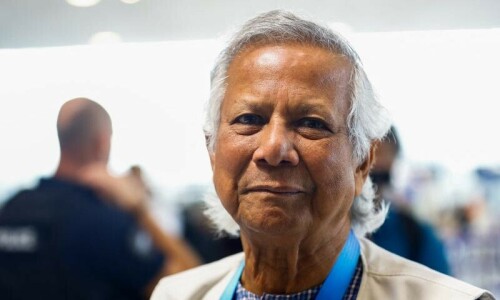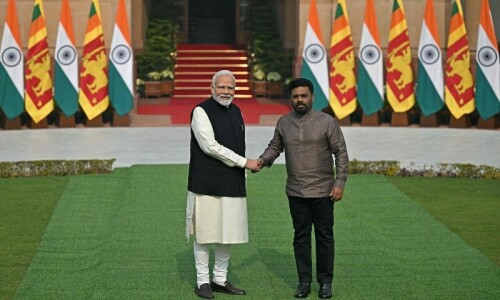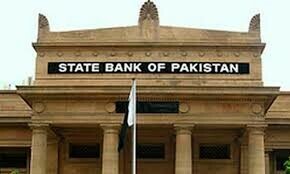
WHY democracy was not recommended by classical thinkers was that it bore the germs of populism which is a tyranny of the people. That made it a liability.
In other words, ‘too much’ democracy is bad. That is a lesson that the establishment in both the US and UK needs to learn. Brexit, for instance, has Theresa May literally squirming in its grip. And almost half of Britain rues the referendum.
However, the prophets of doom are not necessarily right. Trump may have broken, unbidden, into the charmed circle of US politics. But he is no Hitler in the making. And he clearly doesn’t know the ropes — as yet. He will learn in good time that it does not pay to be defiant of the popular vote or, for that matter, of Xi Jinping or Ayatollah Khamenei.
Europe is seemingly a piece of cake to leaders such as Trump. It can be tackled with considerable ease. The less ideological baggage the better — so the president-elect doubtless feels.
When populism takes over, there is no room for high-mindedness such as that of Germany’s chancellor or France’s president. ‘Liberal values’ are quickly got rid of.
When populism takes over, there is no room for high principles.
What we are witnessing today is a bizarre paradigm shift. Humanism is seen — finally — ceding to its other. Principle and ideal don’t count for much any longer. A thinly disguised barbarism reigns.
However, detractors notwithstanding — and though many in the US political elite disapproved of what they saw as his dithering — Barack Obama has shown extraordinary prudence and restraint.
The ‘red lines’ that got crossed, as in the case of Syria, were not, as presumed, signs of weakness but of deliberation and mature forethought. The fact that the US was less gung-ho over Libya than Britain and France pointed to Obama’s genuine concern for world peace.
It is a concern that has coloured both of his tenures and made him stand out in stark contrast to his predecessor. Commentators at times seem dismayed by Obama’s intellectualism. However, the world will be a bleaker place when he vacates the White House.
The choices made by Trump for his future administration clearly do not augur well. Jefferson Sessions, picked by Trump for attorney general, has a particularly unsavoury reputation. Given that he is a racist with no time for civil rights, his appointment is sending out all the wrong signals to liberal America. The choice of Pompeo, like that of Flynn, is thought to be no more reassuring.
White supremacy is on the cards. It is feared that Muslims and blacks will be targeted for the sake of making America ‘great again’.
Much, including the Trans-Pacific trade deal, hangs in the balance. At the same time, much is still not clear though Shinzo Abe was reportedly satisfied with his unofficial meeting with Trump.
However, what is comforting is the fact that the world is wiser post-Iraq and also post-Libya. In the wake of the Chilcot report on Iraq and the UK Foreign Affairs Committee report on Libya, it is unlikely that we will witness the shenanigans of the Bush-Blair era.
Blair has been put in the dock over his part in the Iraq invasion and the number of civilian casualties caused. Cameron has similarly been under fire over “erroneous assumptions” in the context of the Libya intervention. Theresa May, on the other hand, presents an image that is reassuringly different from that of Mrs Thatcher.
Much as Trump may wish to ‘tango’ with Putin, the restraining voices in Congress and the Senate will surely not go unheard. There is already considerable pressure on Trump — at the hands of President Obama and numbers of others in the political world and media — and it is likely, if anything, to grow.
The institutional strength of the American democratic system, evolved over time, will probably not facilitate Trump in any form of adventurism that may hazard the US’s own security.
There are undoubtedly various bugbears that have to be reckoned with. But one thing seems clear. Trump’s purpose was to ‘shake’ the world. He has certainly succeeded in that. Such men can be decidedly dangerous. But, in our day, they can also be contained.
In our own country, Imran Khan shakes us up from time to time. It may be good for the health of Pakistan’s own democracy. The system may — and does — need an occasional jolt. But that is all.
The saner elements in the country are not overly keen to see the whole democratic edifice pulled down to suit a single individual and his cohorts. Even so, it would help to learn from the US’s recent electoral experience.
We too ought to know which way we should be heading. More — and better — education together with enhanced social and political awareness is obviously among the answers.
The writer is the founder chairman of Dialogue: Pakistan, a local think tank.
Published in Dawn November 29th, 2016











































